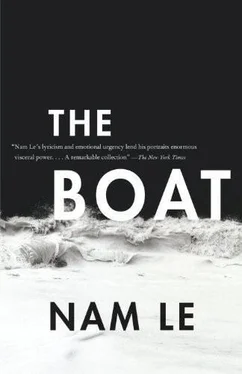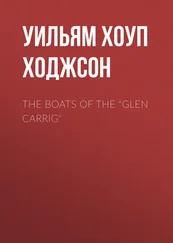Beneath her, the house roused slowly into sound. She lay in the tub, studying the high, molded ceilings, taking in the scents of lacquer and rosewater. She'd made it through the night. Was Parvin awake? Sarah felt toward her now a mild, civilized remorse-as if all her antipathy had exhausted itself the previous night.
As she dressed, the sound of amplified stereo static, followed by a haunting ululation, piped through the street bullhorns. The call to prayer. She went to the wood-shuttered window, looked out through the web of large leaves. The sound touched a deep chord within her. For the first time, she strove to imagine the cleanness of belief that could pull all those foreheads to stone, unwaveringly, five times a day. What was the lie? That you could change your life? She looked out, watching the unknown city roll out before the new sun, its dazzling labyrinth of streets and walls, its villas and bazaars, the evil vizier cast down for good into the valley and the smog burned off to unveil magnificent Damavand — vast and near, seamed with snow and meltwater. It was a two-minute peace — she knew that — but she allowed it.
"I know, it still gets me too."
Sarah turned around and saw Parvin in the doorway. She wore, uncharacteristically, a long, fluid, green dress, and her mouth was pressed tight.
Sarah started to speak but Parvin held up her hand. She sat down on Sarah's bed. The call to prayer continued, the man's voice so elongated, so reedy, it sounded like an instrument.
"There's a word in Farsi," Parvin said, " Khafeghan . It means a feeling where you can't breathe. A kind of claustrophobia." Parvin lifted her face and stared straight ahead. "You hear it used a lot over here."
Sarah tried to repeat the word. "I think I understand," she added.
Parvin shifted on the mattress to face Sarah. "Listen," she said, "this is my work. This is what I do now." She made an effort to smile, and then she did. "It's enough that you're here."
"I can't believe it. That I'm here. You're here."
Parvin thought for a moment, then said, "I won't lie to you. Mahmoud thinks you shouldn't come tomorrow."
"What do you think?"
"There's something else," said Parvin. "One of our members isn't answering his cell phone." She jutted out her jaw, then closed her mouth again. "It's probably nothing, but you never know."
Sarah looked at Parvin, newly surprised by the green dress — gladdened, somehow, by how obliviously she wore it. A vestige of peace abided in Sarah. She wanted to share it with her friend but before she could figure out what to say, Parvin had already stood up and left the room.
***
ALL DAY THE PARTY CONVENED DOWNSTAIRS. Sarah was glad to keep to herself, perusing books in the study — mainly German books on art and architecture. She found the satellite television and sated herself on current events, most of which seemed irrelevant and repetitive. She watched clouds move across the mountains. Jet-lagged, she fell asleep.
Late in the afternoon Roya barged into her room. Sarah barely recognized her at first, fully arrayed, as she was, in robe and head scarf.
"Parvin is gone," she said. She looked at the cell phone in her hand. "Reza says she is going to the square."
"Is she okay?"
Roya shrugged, her expression indistinct. "He says she is meeting with the drama group. He went with her to help."
"Wait," said Sarah. "Where are you going?"
"I am going out." She puckered her lips, shot Sarah an astute look. "I think Mahmoud is driving to the square."
It was almost dark when they left. The motorway was clogged — cars like theirs — wide and metal and box-nosed. They turned down a one-way street straited on both sides by canals. Buses belched out charry exhaust. Sarah looked and spotted men with kerchiefs over their faces, women with rearranged scarves. A city of bandits. Suddenly a bus — going the wrong way — roared straight at them. She gasped, closed her eyes, then realized they were okay. The contra-fiow lane, said Mahmoud, muttering his reassurances.
Neither of them wanted to talk about Parvin. They talked instead about the program for the rally. Sarah asked him about his father. He hesitated, then told her his father was a high-ranking cleric, one rank below ayatollah — here you decided for yourself when you were ayatollah — but his, Mahmoud 's, own religion was more complex. He was born after the revolution. What did that mean? It meant he was supposed to feel a certain way.
He and his father no longer talked.
"I forgot you were a lawyer," he said wryly.
The Party stood for civil rights. That was all. It was not anti-Islam. Nor was it anti-America. After 9/11 they'd come out with the other thousands and did she know what they said? They said, Death to terrorism ! They said, Death to bin Laden ! They said, America, condolences, condolences .
Abruptly he turned to her. "Was Parvin like this when you knew her?"
"Like what?"
"Like she cares for nothing. For no one."
"What are you talking about?"
They rumbled across a low bridge. The water below soupy and junk-filled.
"She's trying to help," said Sarah. Without fully understanding why, she felt — in that moment — that before Mahmoud she would defend Parvin to the very end. She owed her that much.
"And you?"
She laughed uncertainly. "Don't ask me about politics," she said. "I'm just here for her. Moral support."
"Moral support," he repeated.
They parked the car and started walking. A drizzle came down and made the concrete dark around them. At last they reached the edge of a large square. It shone with the changing light of a thousand candles. In the radiance Sarah could see that stalls had been set up in parallel rows and a stage erected at the far end. There was movement on the stage. Two large portraits of the black-bearded martyr bannered down on either side. Above the ground glow, trees had been hung with green lamps. According to Mahmoud, all the candles were to light the imam's passage after his death.
"Is this where…"
"Yes," he said. He pointed at the distant stage, then opened his hand and made a motion like a windshield wiper. "Tomorrow — there will be hundreds here."
"Where's Parvin?" He frowned slightly. "Her phone is not on."
They wandered into the gridded space. It was crammed with people, mostly youth. Gas lanterns and feeble fluorescent tubes. In the half dark, fewer people stopped to notice her. The air smelled strongly of burning meat. Mahmoud behind her, she passed a cluster of stalls selling chains set in wooden handles. Then juice vendors and smoking grills. Her mouth watered; she stopped to buy kebabs and immediately a quick-witted boy accosted them, hawking popsicles. His eyes became large, almost insectoid, when he saw her face.
"I'm sorry," she murmured.
There was a stirring at the far end of the square. The sound of firecrackers and the sputtered brightening of smoke. They couldn't see anything through the crowd.
Mahmoud accepted a kebab from her but didn't eat it. They left the congested market stalls and walked into the green halo of a multi-lanterned tree. "You come to Iran — during Ashura — and do not want to talk politics?" He spoke loudly, over the square's hubbub, and his tone seemed to have risen in pitch. "Who comes to Iran if not for politics?"
She looked at him and realized he was joking. It accorded, she felt, with her beginning ease in this place, her sense of being slowly let in. She recalled what Roya had said about him being a hero. As though he'd read her mind, he turned away.
In front of them was the large stage. Actors mimed a battle scene with much shouting and clashing of wooden swords against shields. They were roundly ignored by the square's swarming youth. Parvin was nowhere in sight. Sarah sat with Mahmoud on a bench near the stage. On an opposite bench, a white-bearded old man bared his stained teeth at them. He was something sucked out from a dream. The tree behind him had flowers in it, a carpet of candles all around its trunk. As the night passed, people came and knelt and added candles in religious observance — shapes of women more fabric than human-form; men same-faced, retreating into their beard-shadows. Who were they? What were they to her? The more she looked, the less she saw of this city.
Читать дальше











